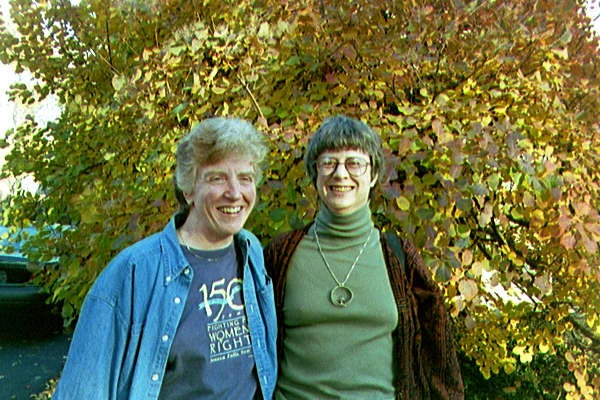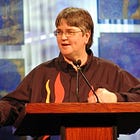How to live a life of faith with integrity
Charlotte taught me the meaning of faith and how to never let go of people who matter.
I first heard about Unitarian Universalism (UU) in the late 70s while my partner Joy was attending Harvard Divinity School. The first Unitarian church I ever entered was in 1979 as we assembled for the first National March on Washington for Lesbian and Gay Rights. All Souls Church Unitarian in Washington, DC, still serves as a gathering place for marches and other protests, and on that day, it felt both disconcerting and comforting to be back in a church building.
When I decided to leave the Roman Catholic Church just a couple of years before, I left behind its misogyny and homophobia. The Catholic Church didn’t consider me equal to the men who ran things, and worse yet, judged me sinful because I was a lesbian. The feeling of being in a church that celebrated who I was stuck with me. However, because Roman Catholicism had felt as much like a cultural identity as a religious one, it was inconceivable to me to consider joining another denomination.
In the years I spent with Anne, I grew more familiar with Unitarian Universalism. Anne’s dad was a UU minister who had served parishes, the UU national association, and even as president of the UU seminary I eventually attended. Especially while together on long sailing adventures along the Maine coast, he shared his faith through stories he told of UU history. When I asked Anne why she didn’t attend a UU church, she said it was because no minister could ever live up to her father in her mind, so it wasn’t fair to them. I never believed that was the real reason, but I had my own church hangups, so I never pushed it.
In 1991, all that changed when we moved to a rural community just south of Flint, Michigan. We went to a Saturday night coffeehouse at the Flint UU church. At some point that evening, we learned the church’s minister was a lesbian. I remember sitting at a table in the fellowship hall, music filling the air, people milling about, and my heart skipping a beat. A lesbian minister. Even with all I had learned about Unitarian Universalism, I hadn’t imagined what it might mean to have a lesbian minister, but I knew I had to find out.
“Anne, can we go to church here tomorrow?” I asked, maybe a little too excitedly. “I need to see this minister in the pulpit.”
Anne hesitated, gazed out the window into the night sky, and, after what seemed like a lifetime, replied, “Alright. Just this once, but I don’t want to make a habit of it.”
“Cool. Yeah. Just this once,” I replied.
When we walked into church the next morning and I shook hands with the greeter, I felt embarrassed by my sweaty palm. I hadn’t realized how nervous I was. I had only been in a Protestant church a few times before in my life and I felt confident that this service would be nothing like those.
When the minister with short brown hair and a wide, disarming smile processed from the back of the sanctuary to the front, my heart began to race. As she ascended the chancel, I had to force myself to breathe. I’m sure I appeared stunned to anyone who might have been looking and I was.
I don’t remember what Charlotte preached that Sunday, but the content of her sermon didn’t matter. All that mattered was that an out lesbian held the attention of a sanctuary full of people—gay, straight, and in between. All that mattered was realizing that I could have a faith community that affirmed my lesbian identity and honored me as a woman. All that mattered was that I had come home. I knew that I couldn’t keep my promise to Anne that we’d visit only once. That service would change the course of my life—I could feel it deep in my bones.
After many long conversations with Charlotte, it still took me another year to “sign the book,” to become a member of the church. Of course, Unitarian Universalism didn’t require that I renounce my Catholic faith—that’s something I put on myself—but that’s what it felt like to me, and, despite the joy I felt with claiming my UU identity, it also made me sad to have to leave Catholicism behind.
Becoming UU, especially after I started talking about going to seminary, was one of the factors that ended my relationship with Anne. She did not want to become a minister’s wife like her mother had been. Neither of us gauged how destructive my finding a life of faith again, as a minister or not, would be to us. Charlotte understood, and when I told her I was leaving Anne, she and her wife Gini welcomed me into their home.
What I quickly came to know was that Charlotte lived and breathed her faith. Most lay people don’t imagine their ministers spending their free time studying the science and sociology of congregational life. But that’s what Charlotte did. She devoured every book and attended every training she could find about theology, church organization, mission, vision, politics, conflict, and growth. Because Charlotte is a natural-born teacher, her excitement about the topics she was studying spilled over into conversation after conversation.
On afternoon, we were sitting at lunch in a Chinese restaurant in Flint. I had returned from my first and only semester in seminary questioning whether I had made the right choice--if I had failed. I picked at the dish of lo mein noodles sitting before me. “You’re not eating much,” Charlotte observed.
“Yeah, I guess I’m not all that hungry,” I said, putting down my fork.
Charlotte leaned forward. “Are you praying?” she asked.
“What?” Am I praying?” I looked at her as if she had asked if I was planning to jump off a cliff. “Well, not right this minute.” I replied. “Anyway, I’m not sure I’m supposed to pray as a UU. I don’t believe in an old guy in the sky anymore, so who am I praying to?”
She sat back and gave me a moment to hear myself. “What nourishes you?” she asked. “How do you revive your spirit to get back to your center? That’s what I call prayer. It doesn’t matter what words you use. Translate into a language that works for you. That’s all prayer is anyway—a connection with the holy, however you define it. What are you grateful for? Who are you thinking about and want to send well wishes to? What grounds you?”
As I listened, her words transported me to Northern Michigan where I had spent hours traversing the hills and ponds. “I feel most centered in the woods,” I said. “I guess that’s how I pray.”
“Well, let’s go then,” she said, an impish grim emerging from what had been all serious just moments before.
And we did. We couldn’t go that day, but within a few days we were in the woods, making trails, following deer signs, watching a dragonfly hatch, sitting by a fire—all things that centered me then and still do today. Because of her wisdom, I now knew these things were my prayers.
It wasn’t long after this that I got involved with a group working to create a Christian UU congregation—not necessarily because I still claimed a Christian identity but because I believed that Christian UUs have a right to pray in their language, without translation. When the congregation formed, I formally left the Flint church, joined this new congregation, and established a connection with its minister. This allowed Charlotte, Gini, and me the freedom to deepen our friendship. Eventually, we chose to claim each other as family.
I learned so much from Charlotte over the next decade that in 2006 I felt confident enough to accept a professional position with the Unitarian Universalist Association (UUA). There I spent the next ten years applying the skills and knowledge she had imparted to me.
Charlotte lives in a “both-and” world where there are no easy answers, where more than one thing can be true at once, and rainbows exist for everyone to embrace. In the restaurant that day so many years ago, she taught me to see the rainbow—all I had to do was look for it.
Even as Charlotte moved on to new ministries in different cities and eventually retired from ministry to her family home in Winnipeg, we stayed connected. “I don’t lose people,” she says. “Chosen family is forever family if they choose to be. Even if time and circumstances change, you’ll always be a part of my family.”
Charlotte taught me new ways to worship, believe, and live in faith. She taught me I didn’t have to give up my beliefs to be part of a faith community, but instead could interpret my faith in new and more expansive ways. But most importantly, through her example, Charlotte taught me how to live a life of integrity, how to love with purpose, and how to never let go of the people who matter.
Next post:






Yup. This is Charlotte!